
- View
Table of Contents
ToggleThe Sunday Roast is more than a meal in the United Kingdom. It is an occasion that brings people together at the end of the week. A table set with roasted meat, vegetables, potatoes, and gravy reflects a tradition that has remained steady across centuries of changing tastes.
It is a dish built for sharing, where family and friends gather to enjoy food that is both hearty and familiar. Each element is prepared with care, from crisp potatoes to rich gravy, creating a meal that is as much about community as flavour.
Across the country, pubs and restaurants continue to serve it on Sundays, often drawing in families who treat it as a weekly ritual. At home, recipes vary, but the essence remains the same, good ingredients, slow cooking, and time together.
Want to dive deeper into British Cuisine? Don’t miss our post on Traditional British Foods to Try
What Is a Sunday Roast?
A Sunday Roast is a full meal centred on roasted meat, usually beef, chicken, lamb, or pork. The meat is roasted slowly until tender, then carved and served with gravy, roasted potatoes, and a variety of vegetables.
Yorkshire pudding is a common addition, especially with beef, while stuffing often appears with chicken or pork. The accompaniments change depending on the meat, but the structure of the meal rarely shifts.
It is served on a single plate, where meat, potatoes, and vegetables meet under a drizzle of gravy. The appeal lies in its balance of textures and flavours, from crunchy potatoes to soft carrots and rich, savoury sauce.
Ingredients and Taste
The foundation is roasted meat. Beef offers a bold flavour, lamb brings a grassy richness, chicken is lighter and comforting, while pork delivers both tender meat and crispy crackling. Each meat sets the tone for the meal.
Potatoes are peeled, parboiled, then roasted in hot fat until golden and crisp on the outside, soft inside. They are a defining part of the dish, often considered essential no matter what meat is chosen.
Vegetables range from carrots and parsnips to peas, cabbage, or cauliflower cheese. Each adds sweetness, freshness, or creaminess, balancing the richness of the meat and potatoes. Seasonality often guides what appears on the table.
Gravy ties the meal together, made from the roasting juices and thickened until smooth. It soaks into the potatoes and coats the meat, turning individual ingredients into a single, unified dish that feels complete and satisfying.
A Taste of History
The Sunday Roast has roots in medieval England, when villagers would gather after church to share a communal meal. Roasting meat was a practical way to cook for many, and bread or puddings often accompanied the feast.
In later centuries, the tradition grew stronger as Sunday became a day of rest. Families prepared a roast that cooked while they attended church, ready to be served when they returned home. It was both practical and celebratory.
Industrialisation reinforced its place, as workers valued a hearty Sunday meal after a demanding week. Meat was a treat, and Sunday was the day it could be enjoyed in full, alongside plenty of vegetables and bread.
Today, the Sunday Roast is prepared both at home and in pubs, continuing as a weekly ritual. Though ingredients may shift with modern tastes, the spirit remains unchanged. It is a dish that carries history to the present table, linking generations through food.
How to Make Sunday Roast (Roast Meat and Veg)
The Sunday Roast is a cornerstone of British culinary tradition, a hearty meal centred around roasted meat, crisp potatoes, seasonal vegetables, and rich gravy. Expect aromas that fill the kitchen, tender slices of meat, and a balance of textures from soft greens to golden roasties. It’s a meal to share and savour with family. See the recipe card at the bottom for printable directions
Ingredients
For the roast meat
- 1.5 kg beef joint (topside or rib) or leg of lamb or whole chicken
- 2 tbsp vegetable oil or beef dripping
- 2 tsp salt
- 1 tsp black pepper
- 2 sprigs fresh rosemary (for lamb) or thyme (for beef or chicken)
For the potatoes
- 1 kg Maris Piper or King Edward potatoes, peeled and halved
- 4 tbsp goose fat or vegetable oil
- 1 tsp salt
For the vegetables
- 300g carrots, peeled and cut into batons
- 300g parsnips, peeled and cut into batons
- 200g cabbage or green beans
For Yorkshire pudding (optional but traditional with beef)
- 140g plain flour
- 4 eggs
- 200ml whole milk
- 2 tbsp sunflower oil
For the gravy
- Pan drippings from the roast
- 2 tbsp plain flour
- 500ml beef or chicken stock
Cooking Instructions
Step 1: Preheat the oven
To begin, preheat your oven to 200°C (180°C fan). Rub the meat with oil, salt, and pepper. Insert rosemary or thyme sprigs for fragrance. Transition to preparing the potatoes.
Step 2: Prepare the potatoes
Parboil the potatoes in salted water for 10 minutes. Drain well, then shake in the pan to roughen the edges. This ensures crisp roasties. Move on to heating the fat.
Step 3: Heat the fat
Place goose fat or oil into a roasting tin and heat in the oven until shimmering. Carefully add the potatoes, turning to coat. Roast alongside the meat later. Transition to roasting the meat.
Step 4: Roast the meat
Place the meat in a roasting tray and put it in the oven. Cooking times: beef rare 20 minutes per 500g, lamb medium 25 minutes per 500g, chicken 45 minutes per kg plus 20 minutes. Baste occasionally. Move to vegetables.
Step 5: Roast the root vegetables
Toss carrots and parsnips with a little oil, salt, and pepper. Add them to the oven halfway through the meat’s cooking time. Transition to preparing Yorkshire pudding.
Step 6: Make Yorkshire pudding batter
Whisk flour, eggs, and milk with a pinch of salt until smooth. Rest the batter for at least 30 minutes. Heat oil in a muffin tin in the oven until very hot. Pour in batter and bake for 20–25 minutes until risen and golden. Transition to greens.
Step 7: Cook the greens
Boil cabbage or beans in salted water for 3–4 minutes until tender but still bright. Drain well. Move to resting the meat.
Step 8: Rest the meat
Remove the meat from the oven once cooked and cover loosely with foil. Rest for 20 minutes to allow juices to redistribute. During this time, finish the potatoes and make the gravy.
Step 9: Make the gravy
Place the roasting tin over medium heat. Stir in flour to form a paste with the drippings. Gradually whisk in stock until smooth and thickened. Season to taste. Transition to serving.
Final Step: Serve the Sunday Roast
Carve the rested meat and arrange on a platter with roast potatoes, vegetables, Yorkshire puddings, and a jug of gravy. Presentation tip: serve family style in large dishes so everyone can help themselves.
Variations and substitutions
- Beef, lamb, chicken, or pork can be used as the centrepiece.
- Goose fat gives superior roast potatoes, but vegetable oil works as a substitute.
- Use spinach, Brussels sprouts, or leeks if seasonal greens differ.
- For Yorkshire pudding, oat milk can be used if dairy is unavailable.
Cooking Tips for Perfect Sunday Roast
- Always rest meat before carving to keep it juicy.
- Roughening parboiled potatoes guarantees crisp edges.
- Heat the fat well before adding potatoes or Yorkshire batter for the best crust.
- Use fresh herbs to complement each type of meat authentically.

Sunday Roast (Roast Meat and Veg)
Ingredients
For the roast meat
- 1.5 kg beef joint topside or rib or leg of lamb or whole chicken
- 2 tbsp vegetable oil or beef dripping
- 2 tsp salt
- 1 tsp black pepper
- 2 sprigs fresh rosemary for lamb or thyme (for beef or chicken)
For the potatoes
- 1 kg Maris Piper or King Edward potatoes peeled and halved
- 4 tbsp goose fat or vegetable oil
- 1 tsp salt
For the vegetables
- 300 g carrots peeled and cut into batons
- 300 g parsnips peeled and cut into batons
- 200 g cabbage or green beans
For Yorkshire pudding (optional but traditional with beef)
- 140 g plain flour
- 4 eggs
- 200 ml whole milk
- 2 tbsp sunflower oil
For the gravy
- Pan drippings from the roast
- 2 tbsp plain flour
- 500 ml beef or chicken stock
Instructions
- To begin, preheat your oven to 200°C (180°C fan). Rub the meat with oil, salt, and pepper. Insert rosemary or thyme sprigs for fragrance. Transition to preparing the potatoes.
- Parboil the potatoes in salted water for 10 minutes. Drain well, then shake in the pan to roughen the edges. This ensures crisp roasties. Move on to heating the fat.
- Place goose fat or oil into a roasting tin and heat in the oven until shimmering. Carefully add the potatoes, turning to coat. Roast alongside the meat later. Transition to roasting the meat.
- Place the meat in a roasting tray and put it in the oven. Cooking times: beef rare 20 minutes per 500g, lamb medium 25 minutes per 500g, chicken 45 minutes per kg plus 20 minutes. Baste occasionally. Move to vegetables.
- Toss carrots and parsnips with a little oil, salt, and pepper. Add them to the oven halfway through the meat’s cooking time. Transition to preparing Yorkshire pudding.
- Whisk flour, eggs, and milk with a pinch of salt until smooth. Rest the batter for at least 30 minutes. Heat oil in a muffin tin in the oven until very hot. Pour in batter and bake for 20–25 minutes until risen and golden. Transition to greens.
- Boil cabbage or beans in salted water for 3–4 minutes until tender but still bright. Drain well. Move to resting the meat.
- Remove the meat from the oven once cooked and cover loosely with foil. Rest for 20 minutes to allow juices to redistribute. During this time, finish the potatoes and make the gravy.
- Place the roasting tin over medium heat. Stir in flour to form a paste with the drippings. Gradually whisk in stock until smooth and thickened. Season to taste. Transition to serving.
- Carve the rested meat and arrange on a platter with roast potatoes, vegetables, Yorkshire puddings, and a jug of gravy. Presentation tip: serve family style in large dishes so everyone can help themselves.
Nutrition
You May Also Like
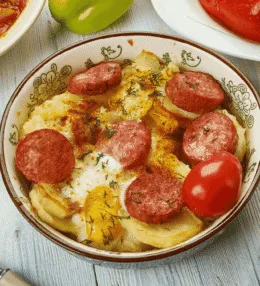
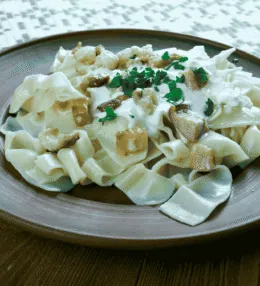




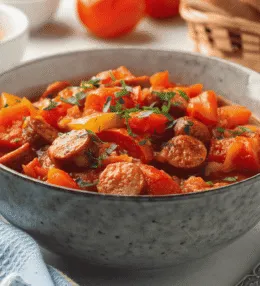
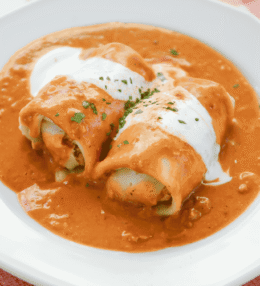
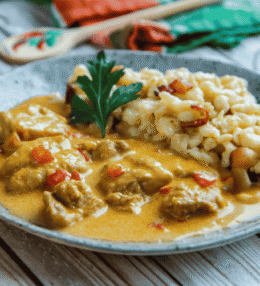
Leave a Review